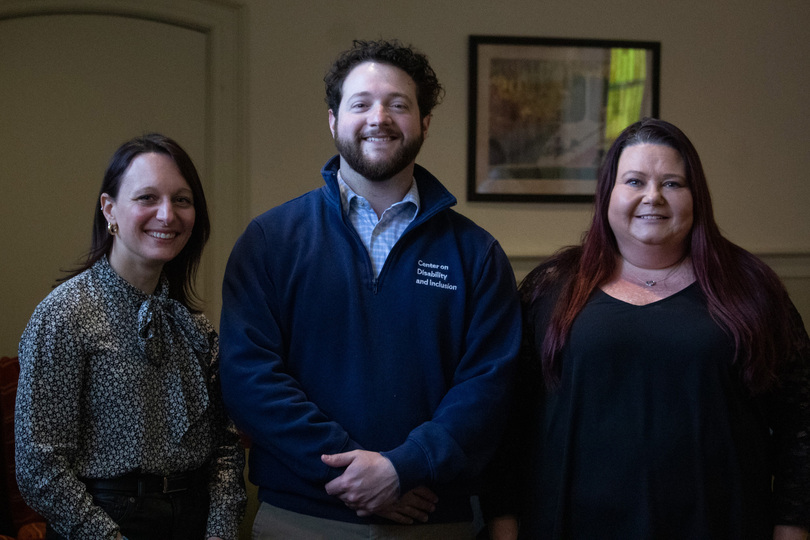SU hosts ‘InclusiveU and You’ session, part of DEIA ‘Lunch and Learn’ series

Cassandra Roshu | Photo Editor
Brianna Shults, Sam Roux and Jennifer Quinn (left to right) spoke at “InclusiveU and You”, hosted by Syracuse University’s Office of Diversity and Inclusion as a part of their “Lunch and Learn” series.
Get the latest Syracuse news delivered right to your inbox.
Subscribe to our newsletter here.
Syracuse University’s Office of Diversity and Inclusion hosted an “InclusiveU and You” session — the fourth installment of its ongoing “Lunch and Learn” diversity, equity, inclusion and accessibility series — Tuesday afternoon in Hendricks Chapel.
In the session, ODI hosted InclusiveU Director Brianna Shults, Academic Coordinator Sam Roux and Internship and Employment Coordinator Jennifer Quinn. The speakers explained InclusiveU’s work to help students with intellectual and developmental disabilities experience college life, and outlined strategies to expand the program.
InclusiveU is an initiative that facilitates access to higher education for students with intellectual and developmental disabilities, according to its website. The program is celebrating its 10th anniversary this year and will host its anniversary event on April 4.
“InclusiveU students are students taking campus classes. Our students participate in internships, both on and off campus. They’re part of clubs and organizations and they live in residence halls,” Shults said.
The discussion was part of an initiative the university introduced during its inaugural D.E.I.A. Symposium on Oct. 3. At the event, ODI pledged to hold several “Lunch and Learn” sessions in spring 2024, each featuring students, faculty and staff dedicated to highlighting the perspectives of underrepresented groups on campus.
Shults began the event by explaining the InclusiveU program and how it collaborates with the broader university to help accommodate students with disabilities.
InclusiveU, a flagship initiative of SU’s Lawrence B. Taishoff Center for Inclusive Higher Education, currently houses around 100 students and is a top higher education program in the country for students with disabilities, Shults said.
“We focus on research, collaboration and technical assistance, helping out other schools and programs (figure) out how to make their program more inclusive or develop this type of program on a college campus,” Shults said.
InclusiveU students have access to the full course catalog and work closely with faculty advisors to find classes on campus that align with their interests and goals, Roux said. He said the program’s main goal is to make higher education more accessible to students who may need accessibility modifications.
“It’s really paramount for us to collaborate with each school and each college directly to ensure that we’re providing the best access that we can to certain classrooms for students,” Roux said.
Roux said SU professors are exploring ways to adapt to InclusiveU’s learning styles, such as allowing students to create PowerPoint presentations instead of writing papers to help students showcase their learning. He said implementing these small accommodations does not require “any extra lift” from faculty.
“We want to ensure that if you (faculty attendees) are feeling stuck, that you have a lifeline and you have someone to go to that spends time with our students every single day and can really be that support for you,” Roux said.
After the presentation, attendees had the opportunity to share ways they think the SU community can advocate for InclusiveU students.
Brooke Tyszka, an attendee working as an academic counselor in the David B. Falk College of Sport and Human Dynamics, said she hoped the “Lunch and Learn” session would help her find ways to engage and accommodate InclusiveU students at Falk.
It's really paramount for us to collaborate with each school and each college directly to ensure that we're providing the best access that we can to certain classrooms for students.Sam Roux, coordinator for InclusiveU
After the group discussion, Quinn highlighted internship opportunities for students in the program.
InclusiveU students participate in a two-semester-long internship in their final year of the program, Quinn said. She said InclusiveU students engage in specialized curriculum in their internships, focusing on developing transferable job skills and opportunities to further employment interests.
Quinn said the internship program tries to align with student interests as closely as possible. Students have the opportunity to complete their internship on and off campus or closer to home, he said.
“Frequently, our students are underexposed to any type of work, volunteer work or paid internship before college,” Quinn said. “We really start with a basic knowledge and build from there.”
InclusiveU students also have an hour-long morning class every day to focus on transferable skills, she said. In the spring semester, they attend a job fair connecting them with local businesses.
Roux also said InclusiveU students get a “full college experience” by living in the residence halls. This year, InclusiveU students live in five different on-campus residence halls, he said.
“A really important thing about living in residence halls is you get the opportunity to experience life away from the people who likely cared for you the last 17, 18, 19 years, which is just an incredible experience for any person to do,” Roux said. “It’s a super important part of growing up, being an adult and we’re glad we’re able to offer those opportunities to our students.”
Quinn also encouraged students interested in working with InclusiveU students to consider applying for its Peer2Peer Program — which pairs matriculated SU students with an InclusiveU student to help support their campus involvement, according to its website. InclusiveU offers four information sessions throughout the year for students interested in applying for the program, Shults said.
“We’re here to be a liaison for students,” Shults said. “We don’t want to take away from their experience, we’re here to support them and to create those connections across campus.”





